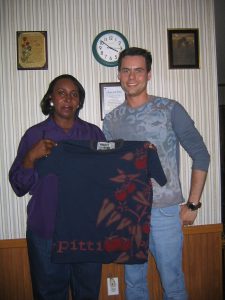
TUSCALOOSA, Ala. – The University of Alabama Office of Community Affairs recently announced funding assistance for “Planting Stitches,” a startup non-profit organization that provides economic development opportunities for women living in the Black Belt region.
“Planting Stitches” works to match talented hand sewers in the Black Belt with companies that market entirely handmade apparel.
“The Black Belt was once a thriving area with many sewing factories and garment production. The plant closings left a wealth of talented women in these communities and ‘Planting Stitches’ is a way for us to capitalize on that talent, as well create viable and sustainable jobs,” said Dr. Samory Pruitt, UA vice president of community affairs.
“The Black Belt region has double digit unemployment rates, and entrepreneurship is the key to solving some of the economic and financial problems that plague residents in the area,” added Pruitt.
He said the money provided by UA is expected to affect the lives of more than 125 female-owned small businesses in Sumter, Pickens, Greene, Hale, Perry, Marengo, Choctaw, Dallas, Wilcox, Lowndes, Macon and Bullock counties. The region is nicknamed the Black Belt for its rich, dark soil.
Brian Taylor, executive director of “Planting Stitches,” and a graduate student in the College of Human Environmental Sciences’ clothing, textiles and interior design department, started the non-profit organization as part of his master’s degree project.
According to Taylor, the program is involved in a cooperative business venture with Project Alabama, a for-profit apparel company located in Florence which designs and produces 100 percent cotton, entirely handmade apparel, sold internationally to 70 exclusive retailers.
“Project Alabama sub-contracts work to over 120 independent contractors, or hand-stitchers, in and around the Florence area. Due to the labor-intensive hand workmanship associated with each piece, prices range from $350 for a t-shirt to $10,000 for a dress,” said Taylor.
“Planting Stitches enables women living in the Black Belt to receive some of this work through training and through transporting the work to the Black Belt region on a weekly basis,” Taylor said.
Taylor takes a hands-on approach with the program, going into the communities to train the women on how to become business owners.
“I help them do everything from securing a business license to purchasing sewing supplies.”
Pruitt said that he is impressed with Taylor and the entire project.
“I serve on the Board of Directors of the Black Belt Community Foundation and the theme of that organization is ‘taking what we have to make what we need.’ I believe that Brian’s project embodies that theme and is consistent with the current sentiments of those living in the Black Belt,” said Pruitt.
“I commend Brian on his efforts and am delighted that he approached us about investing in this project.”
For more information, go to the program’s web site, www.plantingstitches.org.
Contact
Suzanne Dowling, 205/348-8324, sdowling@ur.ua.edu
Source
Dr. Samory Pruitt, UA vice-president of community affairs, 205/348-8376, samory.pruitt@ua.edu